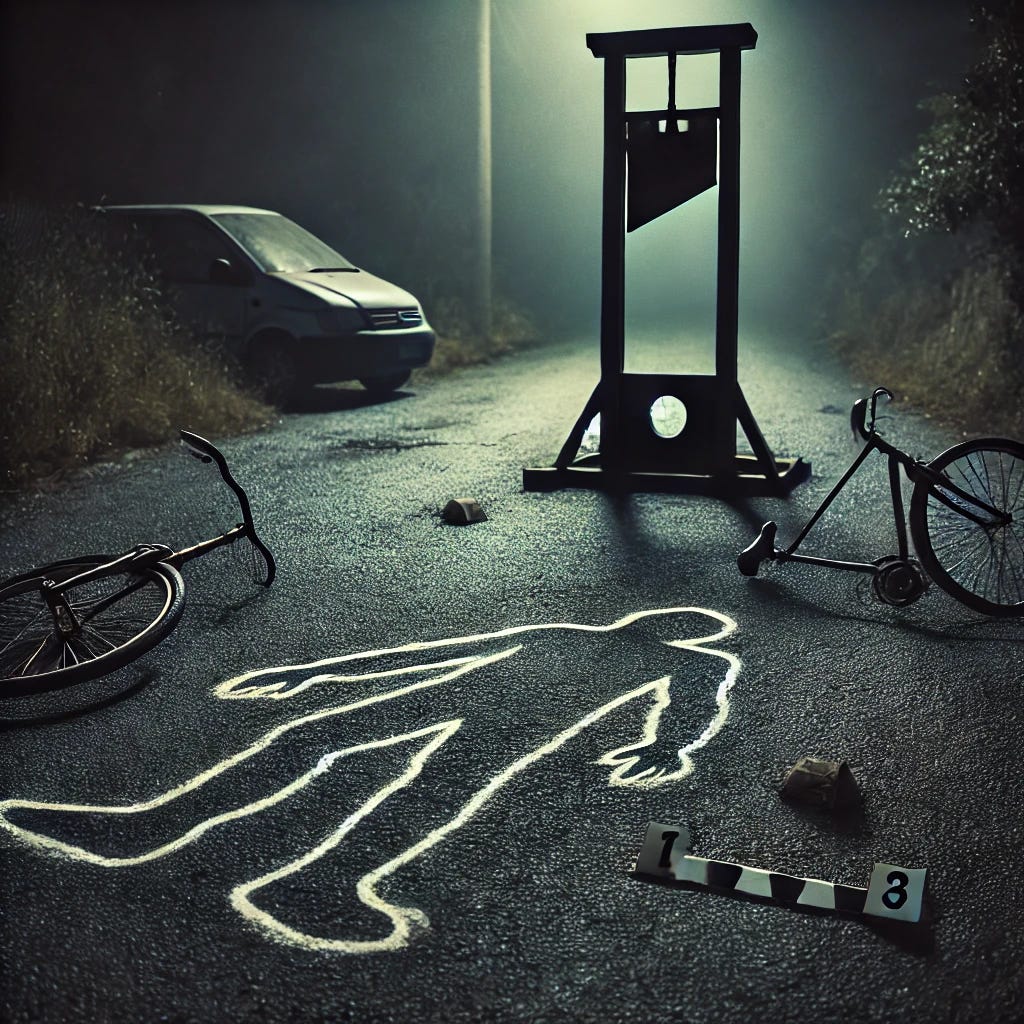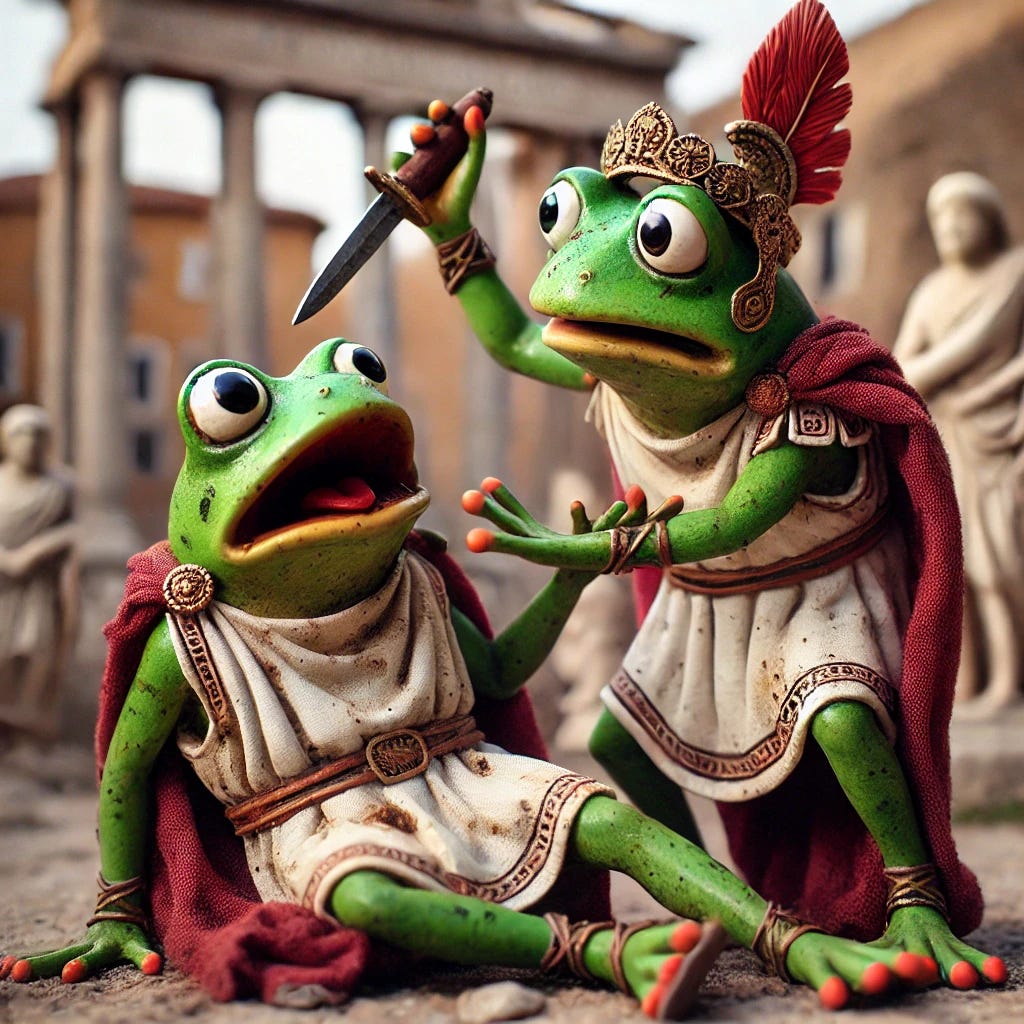Help! I've [been stabbed in the back by one of my oldest friends], and I can't get up!
Biker, ep. 5: We recap Nanny State, "Reject Modernity," Herd Mentality, etc., and embark on a quest for revenge. . .
We’ve been talking, over the last few posts, about an incident I witnessed a few weeks ago while I was walking home. There was a film production company shooting in a house across the road, so I pulled out my phone to try and find out whether any A-listers were on site. (The project was called Too Much; it was written by Lena Dunham and would feature Will Sharpe, the guy who played the boyfriend of Aubrey Plaza’s character from White Lotus season 2 . . . but I’m not sure either of them count.)
Anyway, as soon as I looked down at my phone, I heard a flesh-on-metal crash behind me, and turned to see that a cyclist had apparently whizzed past me and gone straight into the back of a parked truck, the loading ramp of which was extended horizontally at neck-height. The way he was sprawled out on the concrete, it looked very much as if he’d managed to decapitate himself.
Artist’s [dramatized] depiction:

It was not clear why or how this “traffic collision” had happened; it was a dry, clear day, and road conditions were perfect. As such, I’d spent the last couple of posts here searching for answers—and trying to figure out who was culpable.
In this one, linked below, we asked whether or not the film production company had committed any wrongdoing. Technically they’d just left their truck there, in a legal parking spot, unmanned. Sure, its loading ramp was potentially a tool for dismemberment, but was that their problem? After all, lots of seemingly-harmless things could be employed for sinister purposes; where do you draw the line?
This sent us down a “Guns don’t kill people, people kill people” rabbit hole, during which we pondered how one might go about “baby-proofing” the world, given that anyone who’s intent on doing themselves or others bodily harm will probably be able to do so with instruments far less “obviously” dangerous than actual guillotines or firearms.
This idea (i.e., what role the state should play in putting up these sort of societal guardrails) is especially interesting when it comes to the “melting pot” of the modern world, what with all our different ideas about what a “cohesive,” advanced, society’s ethics/goals should look like. (This also means norms and laws can change quite quickly; for example, the banning of smoking indoors and on planes, which we now completely take for granted even though it was only a couple of decades ago.) Gun control/seatbelts/smoking are the more obvious debate, but there’s infinite directions you can go: Should restaurants be required to list the calorie count of their offerings? Etc.
We then wondered whether the man’s seemingly inexplicable crash had actually been an ultimate celebration, then, of his individual sovereignty; a commentary on a world where the overbearing Nanny State encroaches ever further into our lives, as if it knows best. “Smoking kills? So what!? I’ll do what I want!”
Or maybe, in a similar vein, it was a sort of lament, for a world that used to be linear and comprehensible, where our interactions with each other/the world were transparent and predictable and analog. The guillotine was a relic of this simpler time. A time when men were men, etc. That post is here:
We’ve also been reflecting on broader trends/patterns of behavior. Namely, that there will always be contrarians, folks who flat-out refuse to comply with any suggestions/laws passed down by any authority sheerly on principle. This applies even if the directive in question applies to something that even the subject knows to be in their best interest. (Although we’ve also discussed how this stubbornness exists for a reason.) We’ve been discussing the implications of all this in a digitizing world where “authority” and “control” are increasingly faceless, de-centralized, and far, far more omnipresent than it’s ever been, and if we therefore might need to rethink our relationship to concepts like “government” and “authority” and “individual agency.”
Heavy stuff. Thankfully, we’re spared from having to dig any deeper into this nonsense (for now) . . .
After a few moments of stunned silence, the man then began to wheeze and moan and writhe around. Reports of his death had, it turned out, been greatly exaggerated; his head had not been clotheslined clean off his body. Before long, a staff member found the on-site medic, who came over and tended to him.
All of my theories that’d revolved around him intentionally guillotining himself had been somewhat undermined, anyway, given his choice of clothing: a high-viz, neon yellow jacket, a helmet with one of those road cameras attached to the top (how priceless would that footage be!?). As such, the only viable explanation I can think of was that he’d been rubbernecking, trying to look over into the house/garden where the crew were filming.
(Apparently not everyone calls this “rubbernecking”!? Like when traffic slows down because everyone wants to get a better look at a car crash? There’s a quiz I remember from a while ago that can approximate where you’re from in the US based on the different terms/pronunciations you use for things. “Soda” vs. “pop,” etc. . . I think I found it here!)
Anyway, the other thing you realize—and thankfully these sort of incidents don’t happen too often, so we (i.e., the voyeurs/witnesses) aren’t regularly exposed for being shitty people—is that there’s something about this sort of incident that impels us to laugh. I know this because, as I looked around at the crew and the other passersby, I saw the universal trying-not-to-giggle-twitching at the corners of every mouth. For the record, this only started once we were sure he was 100% alive/“capitated,” which maybe lets us off the hook a little. We’d never want him to actually be dead, or grievously injured—we aren’t monsters…
It’s still a little concerning, though, because, if we’re honest, laughter of this specific genre is definitely slightly more sinister than a laugh of pure relief. There’s an undeniable note - not that any of us would ever admit it - of amusement. So what’s going on here? Are we all bad people, under the surface? Or is this response neutral (and thus acceptable), morally speaking? After all, it’s not like we can help laughing when we see the pantomime fool/stooge slip on a banana peel or whatever; it’s instinctive.
The “official” word for this is a German one, and captures the nuance better than anything we have in English; Schadenfreude: “taking pleasure in others’ discomfort.” I’m reliably informed [by Wikipedia] that the three main ingredients/drivers for this are: Aggression, Rivalry, and Justice. Hmm. . . Well, as far as aggression, I didn’t feel any animosity towards the biker. Not at any conscious level, at least. I’d never met him, nor, as far as I know, had I ever even seen him before; I hadn’t even heard him whiz past me before the crash. So I’m ruling “aggression” out for now, and “rivalry,” too. (Unless it’s a more primal thing, i.e., I’m happy to see a potential competitor [for available mates] bite the dust. . . But I doubt it.)
This left us with “Justice,” which was, at least, the most noble-sounding of the three possible factors.
Evidently, some part of me was happy to see retribution handed down—but retribution for what? I knew nothing about him, except that he was an old, white dude. Was it something to do with his race? This was a white-guilt thing, perhaps; my time in South Africa had radicalized me without my knowledge.
Maybe it was his age: the “anti-boomer” sentiment expressed in some of my earlier posts was less ironic than I realized.
Or, maybe, my moral high-ground had even pettier foundations, like: “That’s what you get for rubbernecking, you nosy bastard,” (or “for wearing that silly-looking jacket in the middle of the day.”)
Obviously, none of these theories are too satisfying—none of them reflect too well on yours truly. According to Wikipedia, it seemed like I was fucked regardless: apparently, there’s a negative correlation between “Schadenfreude” and self-esteem: the lower the latter, the more often/more intensely we experience the former.
I couldn’t believe my eyes. Wikipedia, my old friend, had turned on me, not just armchair-psychoanalyzing me without my consent, but outing me as an insecure, spiteful little cretin. E tu, Wikipedius? This is the thanks I got for donating $5 back in 2018, I guess.
I know; I’m shooting the messenger. ‘Pedius was just relaying the facts. This couldn’t have been easy for him, either. Still, I resented his accusation; and, whether he liked it or not, these were fightin’ words, and I wasn’t going to go down easily. (“You want low self-esteem? I’ll show you low self-esteem!”)
But I knew I still needed a credible defense; anything to justify—even just in part—my apparent moral shortcomings. But what on earth would it be? I prayed long and hard into night, begging any/all deities I could think of to help get me off the hook. In the end, one of them must have heard me, and taken pity. Not a top level one, I don’t think, but I wasn’t about to look a gift horse in the mouth. The divine assistance came in a somewhat camouflaged form. It took me a couple of sleepless nights before things clicked, but click they certainly did. . .
Make sure to subscribe to be kept up to date on our hunt for revenge/justice:






